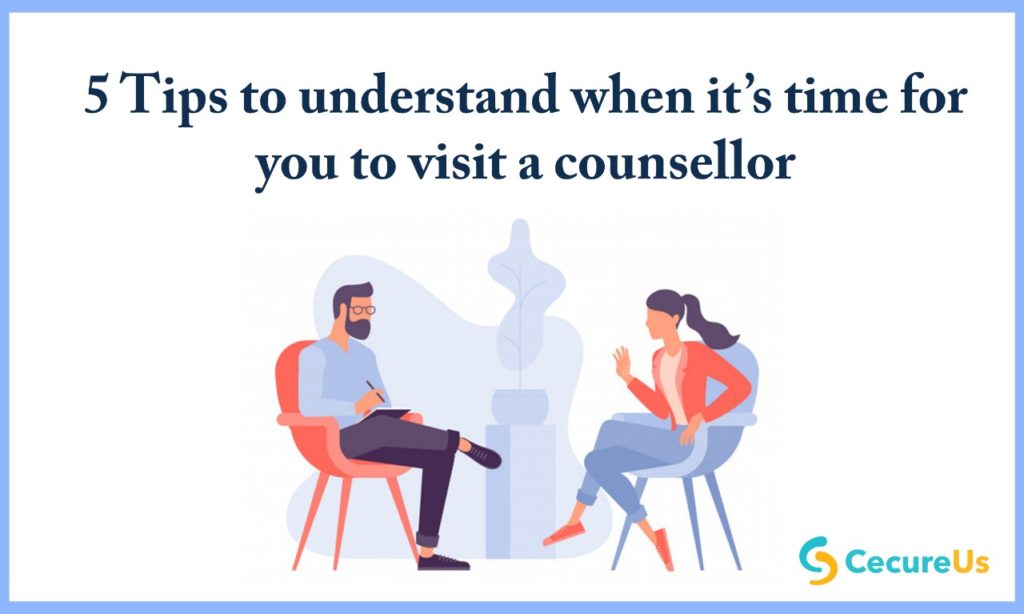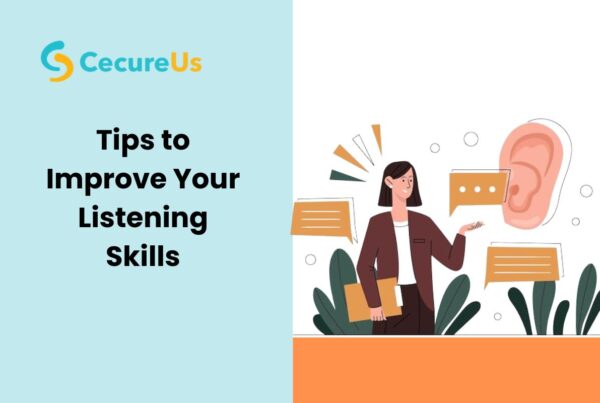
The stigma around counselling and mental health is slowly but steadily clearing away, and thanks to the Employee Assistance Program(EAP) in organizations, many have begun to consider visiting a counsellor to better understand or treat their mental health issues. More often than not, we are not sure if it is indeed time to take a leap of faith and set up an appointment with a counsellor to resolve our mental health issues.
We have put together some tips to help you understand if you need professional help from a counsellor to take care of your mental wellbeing.
Before you read on, to know the difference between counselling and psychotherapy, click here https://cecureus.com/differences-between-counselling-and-psychotherapy/
Now, here goes:
You feel that you have no one to talk to or listen to your emotional struggles:
Times have been difficult with many stranded away from their friends and loved ones. This has triggered several mental health issues like fear, anxiety, and depression. Some may find that they have no one to talk to or no one willing to listen to them. If you are under extreme stress and need a listening ear to help you feel better, you may consider fixing an appointment with a counsellor. They are trained professionals who patiently listen to your emotions without judgment and help you sail through difficult times. You can talk to a counsellor through Employee Assistance Programs. A safe space that is confidential, comfortable, and unassuming could do wonders for your mental health.
People who form a part of your support system suggest you visit a counsellor.
In times of doubt or conflict, we reach out to specific people for specific issues, be it relationship issues, work-related stress, or just life in general. They could be our friends, siblings, parents, or partner. If any of them feel that seeking guidance from a counsellor could improve your mental health, it possibly is time for you to consider seeking professional help from a counsellor. Remember that your go-to people may be overwhelmed by their own struggles and mean well. A friend or colleague can suggest or recommend a counsellor through Employee Assistance Program. These programs are discreet and offer complete confidentiality, so you don’t have to worry.
You have been feeling extremes of emotions, are overwhelmed, and find it hard to relax:
We all lose our temper or feel extremely sad, especially after a traumatic experience. You may find it difficult to relax and could be constantly sad and angry, alerting you about your mental health. If you have the urge to cry more often than not or find yourself snapping at others and exhibiting behaviours affecting your day-to-day life, it could be time for you to consider professional help personally or through Employee Assistance Programs. There are self-help assessments organizations offer through their Employee Assistance programs that help you better understand your mental health. Some other things that call for a trip to the counsellor are sleeplessness over long periods (more than a couple of months), feeling restless for seemingly trivial issues, extreme anxiety, and depression. There are curated programs and workshops in EAP that target issues like sleeplessness, stress, and anxiety and offer realistic solutions to overcome them.
You feel triggered often and want to be left alone:
Are you wanting to be left alone, no longer want to be around people, including your loved ones, and feel triggered (extreme anxiety, anger, hopelessness, or depression)? If this has been the state of your mental health and you find it hard to return to a better emotional state, you should know that it’s time you sought professional help. Wanting to be alone is not an issue in itself, but if it is uncharacteristic of you, do not hesitate to reach out to a counselor. Employee Assistance Programs offer you the chance to consult a counselor without worrying about the taboo around mental health or your colleagues and friends knowing your struggles.
Resorting to intoxication for better sleep or feeling better:
Alcohol, drugs, or any other form of intoxication do not help anyone achieve better mental health. If you are someone resorting to intoxication to sleep better, forget issues, or avoid what you have been feeling, it’s a mammoth step in the wrong direction. More so if intoxication has started to become an addiction. Schedule an appointment for professional help either personally or through the Employee Assistance Program to help you sort out your feelings and overcome your addiction. Counselors have the right approach and guide you towards overcoming intoxication and addiction issues to get your mental health back on track.
While it is not necessary that you must visit a counselor only for the reasons mentioned above, these are some issues that may warrant an appointment. You may also consult a counselor because you need more from life and feel the need to discuss your insecurities and shortcomings. Therapies have resolved several daily life struggles, including work-life balance, financial planning, relationship issues, parenting problems, trauma and abuse, and even OCD. Studies reveal that employees who have taken therapies through their EAPs have reported resolved issues with an overall improvement in mental health. Counseling sessions, when done right, also help gain perspective, clarity, and self-awareness, further equipping you with tools that enable you to navigate various issues in life.
For more such tips and to know more about seeking help for mental wellbeing, click here https://cecureus.com/category/blogs/employee-assistance-program/





3 Comments